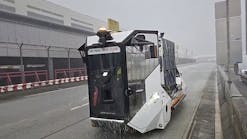Swissport International, a major player in cargo and ground handling operations around the world, recently made its financial results for 2010 public. The company says it earned a total operating revenue of CHF 1.741 billion, which represents a 5.2 percent increase over 2009. It cites several developments in 2010 as contributing to a profitable bottom line, including the start of operations in Munich and new contracts across the globe.
The company expects to experience continued growth in 2011. One such development that it believes will lead to greater gains on the cargo side for the company came in December 2010 when it opened a new warehouse at Jomo Kenyatta International Airport in Nairobi, Kenya. The 10,500 square-meter airside facility will, the company believes, open it up to substantial growth in the region.
New cargo warehouse in Nairobi
According to John Batten, EVP cargo at Swissport, the new facility nearly triples the company’s capacity. “The capacity in our facility is roughly 120,000 tons per year, however, the capacity is largely determined by the import/export mix,” he explains. “Import cargo requires a larger footprint per ton because of storage prior to delivery whereas export cargo requires a much smaller one, in view of the high percentage of shipper built units.”
The new warehouse at the airport in Nairobi features many noteworthy capabilities, including direct access to the airside and five new parking positions for widebody full freighters located directly outside the warehouse. Adjacent to the warehouse is space for the storage of ULDs. It also includes a landside truck dock with positions for 15 trucks, as well as one 20-foot dolly dock for receipt of pre-built units.
The facility has 2,400 square meters of office space, a generous portion of which is designated for airlines, GSAs, clearing and forwarding companies. Offices for customers and other government authorities are also located on site.
Inside the facility is a floor space of 10,400 square meters, which includes a temperature-controlled area for perishables and a space reserved for the consolidation of other types of fresh produce. Four separate cold rooms provide storage for up to 75 main deck units
In terms of IT and security, the facility features automated data capturing and real-time inventory control with the CargoSpot IT platform, through the use of hand-held terminals. The facility has a CCTV system composed of 87 cameras that record and store footage for up to 30 days. Three x-ray machines screen cargo, along with two metal detection machines used in conjunction with hand-held detectors.
The facility, Batten points out, is operated with only electric equipment to provide an emissions-free environment.
For Swissport, the new space represents an opportunity for significant growth in cargo operations. “Thanks to the move to our new facility, Swissport Cargo Services – Kenya expects the volumes handled in 2011 to be 60 percent ahead of those handled in 2010,” he says.
And to accommodate such growth, the company is looking to add staff to handle the volume increase. “The company has about 100 employees at Swissport Cargo Services – Kenya,” he says. “In anticipation of growth, the division does expect to hire on additional staff to support operations. In view of increasing volumes, we will probably grow this number by about 20 percent over the remainder of the year.”
Overall Cargo Outlook in Africa
The company’s overall outlook for cargo in Africa is strong. In South Africa, it has made gains with contract awards from Air France Cargo, Martinair Cargo, Air Cargo Germany and Singapore Airlines Cargo. “With the additional customers won in South Africa in the last quarter of 2010 and first quarter 2011, we would expect our volumes to be more than 35 percent ahead of 2010 tonnages handled,” Batten says. “In Tanzania the perishable market has gained some strength, and we foresee a growth of between 5 percent to 8 percent above the 2010 tonnages.”
Cargo volumes, of course, are difficult to predict throughout most of world. In the latest regional outlook by the International Air Transport Association, carriers in Africa should come out even in terms of profitability for passenger and freight. And, as Batten notes, the region isn’t as susceptible to fluctuations in the market with cargo as others. “The volatility in Africa is not the same as Europe and the Americas, however, we are careful about recruitment,” he says. “Swissport Cargo Services is focused on delivering a top quality service through optimum use of our resources available and through the use of technology in improving the productivity.”
The company conducts cargo and ground handling operations in four African countries: South Africa, Algiers, Tanzania and Kenya. When it comes to additional expansion for both types of operations, the continent presents some challenges for the company. “In some African Countries, the main problem is the bureaucracy in government departments,” he says. “Africa is not yet liberalized in terms of airports opening to foreign companies like Swissport. Although this is slowly changing, the timeframes involved in decision making is often extended.”
Ground Handling in Africa
And on the subject of ground handling operations, Swissport has also been making strides. In addition to adding 1time Airline to its portfolio in South Africa, the company has also added other customers, such as Thai International. These join the carriers it currently handles, including South African Airways, South African Airlink and international carriers, including Delta Air Lines and Air Madagascar. In total the company conducts about 90,000 handling turns each year, according to Batten.
In terms of growth for handling operations, the company’s outlook is much more modest. “We are looking for between 4 to 6 percent growth in ground handling, but this is subject to the political situation in certain North African and Middle Eastern countries, and, of course, the devastating catastrophe in Japan will also have a negative impact on the global aviation business and the rising oil costs,” he explains.
On the operational side, a big push for the company in terms of ground handling operations in Africa includes a greater emphasis to create a working environment centered on occupational health and safety. “We are going through a culture change and trying to create one that embraces health and safety,” he says. “We are investing heavily in training to promote this and make it part of the daily working practices.”






